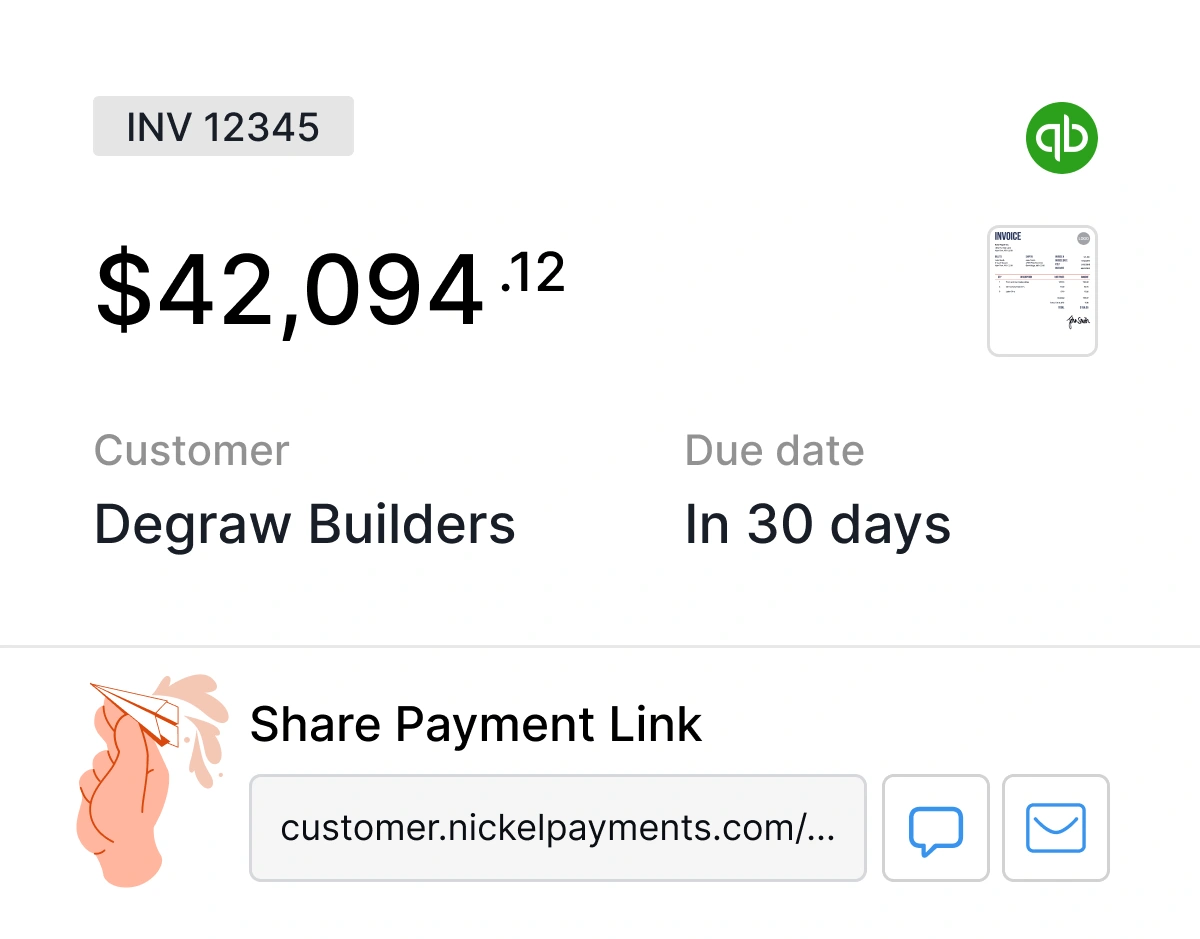Invoicing for Paving Contractors Made Easy: The Payment Platform Built for Your Business
Smooth out your cash flow with payments that actually work for paving professionals

Trusted by 10,000+ industrial small businesses














































Why Paving Contractors Are Switching to Nickel
Unlike traditional payment processors that treat you like a "high-risk" business, Nickel was built specifically for trade professionals who handle large invoice-based transactions. We understand that:
- $45,000 commercial paving projects are normal business, not suspicious activity
- Spring paving season creates payment surges that banks often flag as unusual
- You need reliable processing during peak construction months when cash flow matters most
- Your success depends on predictable payment timing, not arbitrary holds
Result: No surprise account holds, no "business verification" delays, no risk department calls.

Why Paving Contractors Are Switching to Nickel
Unlike traditional payment processors that treat you like a "high-risk" business, Nickel was built specifically for trade professionals who handle large invoice-based transactions. We understand that:
- $45,000 commercial paving projects are normal business, not suspicious activity
- Spring paving season creates payment surges that banks often flag as unusual
- You need reliable processing during peak construction months when cash flow matters most
- Your success depends on predictable payment timing, not arbitrary holds
Result: No surprise account holds, no "business verification" delays, no risk department calls.
Before Nickel vs. After Nickel
- Complex workflows
Multiple systems for invoicing, payments, and bookkeeping - Account holds
Banks freeze accounts over routine $45,000 parking lot jobs - Processing fees
Lose 1-3% on every transaction ($450-1,350 per typical project) - "High-risk" treatment
Banks don't understand paving business payment patterns - Manual reconciliation
Hours spent matching payments to invoices in QuickBooks
- One simple system
Everything integrated: invoicing, payments, and QuickBooks sync - Process large payments worry-free
We understand large and variable transactions are normal for paving contractors and our support team is highly responsive if you ever run into issues - Zero fees on ACH
Keep 100% of what customers pay you - Built for paving contractors
Designed around how your business actually works - One-click QuickBooks sync
Your invoices and payments automatically sync to the right customer, service call, and project, plus seamless AP integration
The Payment Nightmare Plaguing Today's Paving Industry
The $28.8 billion U.S. paving contractor industry faces financial pressures that generic payment processors simply don't understand. With intense local competition and customers increasingly demanding flexible payment options, paving contractors are caught between rising material costs and extended payment cycles that can cripple cash flow.
Seasonal Revenue Concentration:
Paving revenue is heavily concentrated in peak construction months (March-November), with many regions seeing 80% of annual revenue in just eight months. Weather delays and seasonal shutdowns create unpredictable income spikes that traditional banks flag as suspicious activity, leading to account holds right when contractors need cash flow most to cover equipment and payroll.
Material Cost Volatility:
Paving projects require substantial upfront material investments - asphalt alone can cost $3,000-8,000 per job that must be paid before project completion. With asphalt prices fluctuating based on petroleum costs and supply chain issues, contractors often front tens of thousands in materials while waiting 30-60 days for customer payments, forcing them to finance their own clients.
Project Payment Complexity:
Commercial paving contracts involve multiple stakeholders - property managers, general contractors, and municipal authorities - each adding layers to the approval and payment process. A shopping center resurfacing project might require coordination between retail management, corporate headquarters, and municipal permits, creating payment delays that compound across multiple ongoing projects.
Equipment and Labor Pressure:
The construction industry employs over 8 million people, with paving equipment operators earning an average of $22-23 per hour. Between equipment maintenance, fuel costs, and consistent payroll obligations, paving contractors face substantial fixed costs regardless of whether customers have paid their invoices, making reliable cash flow timing absolutely critical for business survival.

The Payment Nightmare Plaguing Today's Paving Industry
The $28.8 billion U.S. paving contractor industry faces financial pressures that generic payment processors simply don't understand. With intense local competition and customers increasingly demanding flexible payment options, paving contractors are caught between rising material costs and extended payment cycles that can cripple cash flow.
Seasonal Revenue Concentration:
Paving revenue is heavily concentrated in peak construction months (March-November), with many regions seeing 80% of annual revenue in just eight months. Weather delays and seasonal shutdowns create unpredictable income spikes that traditional banks flag as suspicious activity, leading to account holds right when contractors need cash flow most to cover equipment and payroll.
Material Cost Volatility:
Paving projects require substantial upfront material investments - asphalt alone can cost $3,000-8,000 per job that must be paid before project completion. With asphalt prices fluctuating based on petroleum costs and supply chain issues, contractors often front tens of thousands in materials while waiting 30-60 days for customer payments, forcing them to finance their own clients.
Project Payment Complexity:
Commercial paving contracts involve multiple stakeholders - property managers, general contractors, and municipal authorities - each adding layers to the approval and payment process. A shopping center resurfacing project might require coordination between retail management, corporate headquarters, and municipal permits, creating payment delays that compound across multiple ongoing projects.
Equipment and Labor Pressure:
The construction industry employs over 8 million people, with paving equipment operators earning an average of $22-23 per hour. Between equipment maintenance, fuel costs, and consistent payroll obligations, paving contractors face substantial fixed costs regardless of whether customers have paid their invoices, making reliable cash flow timing absolutely critical for business survival.
Simplified Modern Workflow
Send invoice (or use your existing invoicing)
Customer pays instantly via secure link
Payment auto-syncs to QuickBooks
Money hits your account in 2 business days
Built-in QuickBooks Integration
Your payments automatically sync to the right invoice, customer, and job. No more:


Compare: Nickel vs. Other Payment Platforms
What This Means for Your Paving Business
Save Money
Zero ACH fees: Save $6,000-15,000 per year on a typical paving business No hidden costs: No setup fees, monthly fees, or surprise charges Early payment discounts: Pay and get paid faster, capture supplier discounts
Save Time
Automated reconciliation: 3+ hours per week saved on bookkeeping Instant invoicing: Send payment links directly from job sites One system: Stop switching between payment apps, banking apps, and QuickBooks
Reduce Risk
Process large payments worry-free: We understand paving transactions and provide responsive support when needed Predictable processing: Money hits your account in 2 business days Secure payments: Bank-level security without the bank headaches
The $28.8+ billion U.S. paving contractor industry faces unique financial pressures that traditional payment processors weren't designed to handle.
The paving industry consists of thousands of small contractors with no single company holding more than 5% market share. Most paving contractors operate as small local businesses with limited leverage to negotiate better payment terms with banks or processors, often getting stuck with high fees and restrictive policies designed for larger enterprises.
Project Economics:
Paving projects typically range from $15,000 residential driveways to $200,000+ commercial parking lots, with contractors often managing multiple simultaneous projects. When customers pay by credit card, processors typically charge 2.9-3.5% plus transaction fees - on a $50,000 parking lot job, that's $1,450-1,750 in fees eating directly into already thin margins.
Cash Flow Challenges:
According to recent construction industry reports, 92% of construction companies reported that customers don't pay them on time, with subcontractors waiting an average of 56 days for payment while believing they'd be paid in 30 days. For paving contractors, this delayed payment cycle creates severe cash flow problems when combined with upfront material and equipment costs.
Workforce and Equipment Financing:
Paving, surfacing, and tamping equipment operators earn competitive wages, requiring consistent payroll regardless of payment delays. Professional paving equipment represents significant capital investment - a commercial asphalt paver can cost $500,000+ while smaller equipment still requires $50,000-150,000 investments. Traditional financing often doesn't account for the seasonal and project-based nature of paving work.

The $28.8+ billion U.S. paving contractor industry faces unique financial pressures that traditional payment processors weren't designed to handle.
The paving industry consists of thousands of small contractors with no single company holding more than 5% market share. Most paving contractors operate as small local businesses with limited leverage to negotiate better payment terms with banks or processors, often getting stuck with high fees and restrictive policies designed for larger enterprises.
Project Economics:
Paving projects typically range from $15,000 residential driveways to $200,000+ commercial parking lots, with contractors often managing multiple simultaneous projects. When customers pay by credit card, processors typically charge 2.9-3.5% plus transaction fees - on a $50,000 parking lot job, that's $1,450-1,750 in fees eating directly into already thin margins.
Cash Flow Challenges:
According to recent construction industry reports, 92% of construction companies reported that customers don't pay them on time, with subcontractors waiting an average of 56 days for payment while believing they'd be paid in 30 days. For paving contractors, this delayed payment cycle creates severe cash flow problems when combined with upfront material and equipment costs.
Workforce and Equipment Financing:
Paving, surfacing, and tamping equipment operators earn competitive wages, requiring consistent payroll regardless of payment delays. Professional paving equipment represents significant capital investment - a commercial asphalt paver can cost $500,000+ while smaller equipment still requires $50,000-150,000 investments. Traditional financing often doesn't account for the seasonal and project-based nature of paving work.
Ranked #1 Easiest to Use Payment Solution by G2
See why Nickel outranks every major competitor, including Forwardly, Melio, and Square
Get Started in Minutes
No contracts. No setup fees. No risk.
Sign Up (2 minutes)
Connect QuickBooks (1 click)
Start Getting Paid (immediately)

Ready to Fix Your Payment Problems?
Stop losing money to fees and time to complicated workflows. Join thousands of contractors who've already made the switch.








